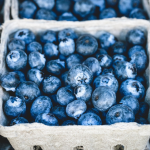A recent study examined the nutritional composition of meat and milk derived from gene-edited cattle bred to be hornless. The two-year-long project provided further evidence vindicating the safe use of biotechnology in food production.
nutrition
A recent study suggested that pesticide residues in fruits and vegetables could counteract some of the nutritional benefits of consuming said produce. Are the results anything to worry about? No, not even a little bit.
Can we get our obesity problem under control? In part one of this series, we saw that common policy responses to our expanding waistlines have failed. Let's now consider why these interventions tend to yield such disappointing results.
Many obesity experts argue that changing the public's "food environment" is the key to promoting widespread weight loss. This proposed solution is not backed by solid evidence.
Miracle foods that keep you "focused and sharp" as you age probably don't exist. Popular news reports claim otherwise, though they're based on flimsy evidence.
Fat-acceptance advocates say medical terms like "obesity" and "overweight" stigmatize fat people and should be eliminated from our vocabulary. They're putting public health at risk to promote a misguided ideology.
Ordering diet soda significantly reduces the number of calories customers eat when they visit fast food restaurants, according to a recent study. The paper is an example of scientists reaching the right conclusion for the wrong reasons.
A new randomized controlled study pits the oft-maligned potato against the virtuous almond. Which of the two causes weight gain? Should we eat this, not that? What does the research say?
A new systematic review and meta-analysis suggests that drinks sweetened with sugar substitutes may promote weight loss. Could these results end the dispute over the benefits of diet soda? Let's take a closer look.
The 2021 annual conference of U.S. Mayors adopted a resolution to create community “Blue Zones,” as part of the Well-Being Initiative to Combat Disease and Comorbidities. The Blue Zones program is derived from the work of Dan Buettner, a National Geographic Fellow, who identifies regions around the world where people purportedly live extraordinarily long and happy lives.
Ah, the influencer. It’s a new job category for someone who can move markets – at least for goods – by sharing their love of them. This used to be solely the domain of celebrities, but social media has significantly changed that. So when it comes to subjects related to nutrition, the question is: are they using their influence to help or hurt?
It's time for another installment of the "Health Ranger Chronicles," where we critically examine the strange ideas promoted by Mike Adams' wildly popular website Natural News. This time we investigate a story about Monster Energy's "Satanic" plot to poison our children with sugar and caffeine.











